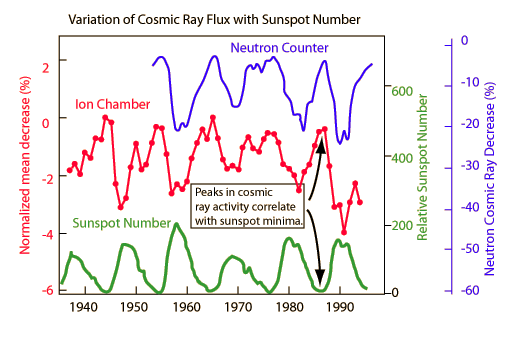Is Solar Activity Affecting Low Level Cloud Formation?
Water vapor is by far the most important greenhouse gas, so small changes in its effectiveness could be important climate drivers. Since it appears that some measure of solar activity other than the relatively constant solar energy output is correlated with changes in global temperature, it has been suggested that solar activity may have some influence on cloud formation. Cloud formation is enhanced when there is some nucleation particle - either a water droplet or a solid particle to act as a nucleus for further condensation (de Pater & Lissauer, Sec 4.4.1). One model suggests that the magnetic activity associated with sunspots modulates the flux of cosmic rays that hits the atmosphere, and that this cosmic ray flux is significant in the nucleation events that promote low level cloud formation. An ionization event by a cosmic ray could leave the nucleation particle charged and enhance its capacity to contribute to droplet formation. If so, then decreased cosmic ray flux implies fewer clouds and therefore higher surface temperature.

This is a sketch of data presented by Svensmark, showing that galactic cosmic radiation is correlated with solar activity as indicated by sunspot number. Svensmark and colleagues also experimented with the effects of cosmic rays on nucleation of aerosols and did demonstrate nucleation events.
On the web discussion site Real Climate it is argued that the recent history of cosmic ray activity shows no correlation with the temperature increase.

| Skeptical views of CO2 driven global warming |
References
Collins, et al.
Svensmark
de Pater & Lissauer
| HyperPhysics***** Thermodynamics | R Nave |